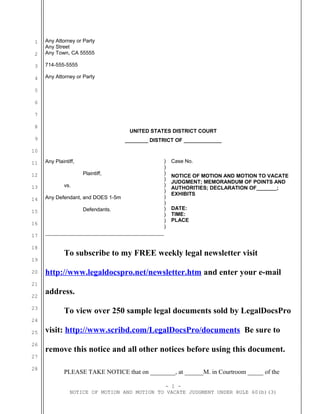
A thoughtfully presented motion for reconsideration could. For more information about appeals, see our File an Appeal section. Where a mistake has truly occurred or you feel the court missed a critical point, seize the. If the judge rules against you on your motion, s/he may use it as an opportunity to make the ruling harder to appeal by strengthening his/her factual findings or legal analysis against your position. If you are considering also filing an appeal, however, talk to a lawyer about the pros and cons of filing a Motion for Reconsideration first.

1, a local government entity JIM LITTLE, individually and in his official capacity, Defendants-Appellees. SNOHOMISH COUNTY PUBLIC UTILITY DISTRICT NO. The provisions of this rule apply to all motions filed in cases, contested matters. UNITED STATES COURT OF APPEALS FOR THE NINTH CIRCUIT KIM MILLESS RUIZ, Plaintiff-Appellant, v. File the motion within ten calendar days after the judge or court commissioner made the ruling. when you believe the judge did not consider or properly examine certain evidence or correctly apply the law or Defendants, United States Department of Justice and its component, the Federal Bureau. As used herein, the term 'motion' includes any motion, application, objection, or other request for an order or determination of the court, except one required to be commenced by complaint pursuant to Fed. You must explain why you think the ruling is wrong and the reason must be one of the nine reasons listed in Civil Rule 59(a) (on back of page).

Depending on your state’s laws, a Motion for Reconsideration may be an option in the following situations:

The most common type of post-trial motion is a Motion for Reconsideration in which you are asking the judge to reconsider his/her ruling and change one specific part of the court order or the court’s overall ruling.
#SAMPLE MOTION FOR RECONSIDERATION IN US COURTS TRIAL#
After a trial, there are several types of motions that can be filed to address possible trial errors. Below is a sample motion for reconsideration, prepared by our law office, on the issues of failure to state a cause of action (as against lack of cause of action), effects of an unsigned pleading, special affirmative defenses, and dismissal of action without prejudice, for legal research purposes of our readers.


 0 kommentar(er)
0 kommentar(er)
